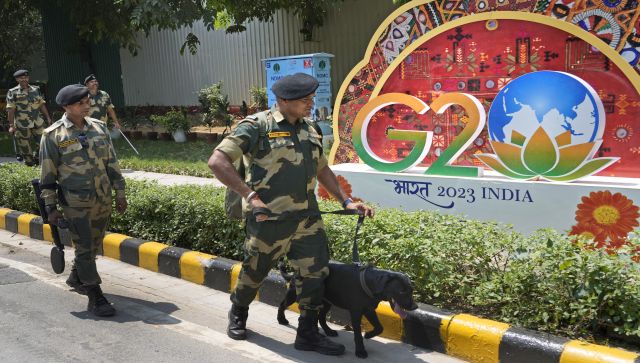China is infamous for being notorious. The recently concluded G20 Summit in New Delhi was no different. First President Xi Jinping decided not to attend the gathering and instead sent Premier Li Qiang. While speculation is rife about Xi’s decision, Beijing did not offer any explanation. Now reports have emerged of drama at a five-star hotel in Delhi, where the Chinese delegation for the summit was staying. Suspicious bag, equipment by Chinese G20 delegates A bag with “unusual dimensions” carried by a member of the Chinese delegation caught the attention of security personnel at Delhi’s Taj Palace Hotel at the time of check-in. While the security allowed the bags in keeping in mind diplomatic protocol what followed was a 12-hour chaos, which left intelligence agencies in a fix. The odd size of the bag did not go unnoticed by trained security which is always on the lookout for signs of suspicion. But that was not all. Later, in one of the rooms, a hotel employee spotted “suspicious equipment” inside two bags, according to a report by NDTV. The matter was escalated and superiors at the hotel reportedly intervened. Members of the security department asked the Chinese to put the bags through the scanner. This led to a tense standoff, as the delegates did not agree to get the bags and their contents checked, reports The Times of India (ToI). [caption id=“attachment_13118082” align=“alignnone” width=“640”] The Chinese delegation was staying at the Taj Palace in New Delhi. The security at the hotel raised an alarm over an unusual bag. ANI[/caption] The team at Taj said that while Chinese security personnel refused to get the equipment checked the Indian security team stood its ground The matter was resolved after Chinese officials agreed to send the bags to the embassy. The NDTV reports says that the security team stood outside the hotel for 13 hours but the Chinese did not allow their bags to be checked. “The Chinese delegation, after a long discussion, then moved their bags to the embassy,” the source said. Was China spying? Top officials told the ToI that they did not get to examine the equipment and hence could not say with certainty that this was a “surveillance set-up”. An intelligence official reportedly told his seniors that such devices are often used to intercept and jam secure communication channels. But the contents of the bags that the Chinese were carrying are not known. A ‘private internet’ connection The Chinese officials continued to behave suspiciously. They asked for a separate and private internet connection at the hotel, which they declined, reports ToI. The Brazilian president
Luiz Inácio Lula da Silva was also staying at the Taj hotel. Brazil is the next president of the
G20 . Also read: Revealed: Why China’s Xi Jinping is skipping the G20 meeting in Delhi China’s bid to infiltrate UK parliament On the sidelines of the G20 Summit, UK prime minister Rishi Sunak raised concern over the Chinese interference in Britain’s parliamentary democracy during a meeting with Li Qiang, after the reported arrest of two alleged spies. The Sunday Times reported that one of the people arrested on suspicion of
spying for China was a researcher in the British parliament. Sunak said he was limited in what he could say about an ongoing investigation but told reporters he had raised “his very strong concerns about any interference in our parliamentary democracy, which is obviously unacceptable”, with Premier Li, reports Reuters. [caption id=“attachment_13118122” align=“alignnone” width=“640”]
Chinese premier Li Qiang attended the G20 Summit in New Delhi after President Xi Jinping decided to skip the gathering. UK PM Rishi Sunak raised concern over Beijing’s interference in the UK parliamentary democracy during a meeting with him. File photo/AP[/caption] Other spying allegations against China The equipment on the Chinese delegation in Delhi and Sunak’s remarks come as no surprise. Beijing has used various strategies to
gather knowledge about other nations. According to researchers and Western intelligence officials, China has become adept at hacking rival nations’ digital systems to gather trade secrets. A common technique used by Chinese operatives is to tout insider knowledge about the Communist Party’s opaque inner workings and dangle access to top leaders to lure high-profile Western targets, reports AFP. The United States warned in 2022 that the Asian giant represents “the broadest, most active, and persistent cyber espionage threat” to its government and private sector. [caption id=“attachment_13118182” align=“alignnone” width=“640”]
This six-storey glass facade building was believed to be the site of a foreign police outpost for China in New York’s Chinatown. File photo/AP[/caption] Beijing has reportedly set up
“secret” police stations in the US and Europe. In April, two men were arrested on charges that they helped establish such a police station in New York City on behalf of the Chinese government, and about three dozen officers with China’s national police force were charged with using social media to harass dissidents inside the United States. China has reportedly set up at least 100 such police stations in 53 countries the world over including Canada, the United Kingdom, the Netherlands, and the Czech Republic. Beijing has leaned on Chinese citizens abroad to gather intelligence and steal sensitive technology, according to experts, US lawmakers and media reports. One of the most high-profile cases was that of Ji Chaoqun, who was in January sentenced to eight years in a US prison for sharing information on possible recruitment targets with Chinese intelligence, reports AFP. With inputs from agencies
China is known for its trickery. Reports have emerged that bags of G20 delegates raised an alarm at the Taj Palace hotel in Delhi. Some luggage carried suspicious devices and the Chinese officials resisted to put them through a scanner
Advertisement
End of Article


)

)
)
)
)
)
)
)
)



